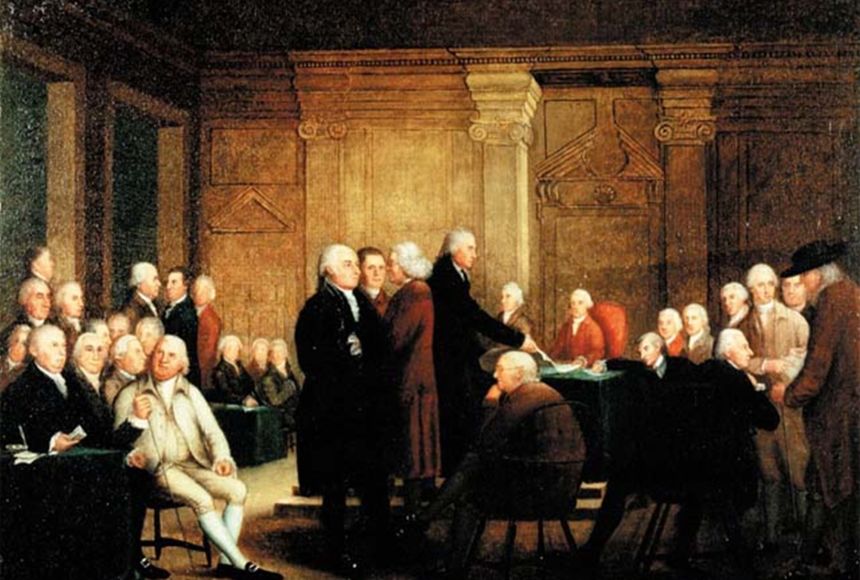Elbridge Gerry and the Signing
On 3 August 1776, Elbridge Gerry sent a second letter to his Continental Congress colleagues Samuel and John Adams.
Gerry wrote this time from Watertown, still the home of the Massachusetts legislature. He had traveled through Boston, seeing both Adams wives.
Gerry and the Adamses were among the Congress’s most radical delegates, resenting men who hung back from independence. In this letter, for instance, Gerry wrote of “our old Friend Mr.L—— or any other suspected Characters.”
Generally, the Marblehead merchant was optimistic about “the true State of Things in the eastern Colonies,” as people called New England. He had ideas about moving troops around and getting Benjamin Lincoln, then still a Massachusetts militia commander, a Continental commission. But he was confident in the militia system, concluding, “We have eastward of Hudson’s River at least 100000 Men well armed, a Force sufficient to repulse the Enemy if they were forty thousand strong at New York and Canada.”
One significant detail about this letter isn’t its text but its date. It shows that Gerry was in Massachusetts on 2 August when, as the Congress’s official record states, the delegates then present signed the engrossed (handsomely handwritten) Declaration of Independence. Gerry must therefore have added his signature later in the year.
In this article for the Journal of the American Revolution I discussed a story told about Gerry’s signing:
At the same time I wrote: “Of course it is possible that Rush’s recollection was not accurate. For example, Harrison could have come up with the witticism days later instead of at the dramatic moment of signing.” Or weeks before, when the delegates voted for independence. As Ray Raphael wrote earlier this summer, delegates conglomerated their memories of the vote and the signing.
We can therefore say the anecdote about Harrison and Gerry couldn’t have happened on 2 Aug 1776 when most Congress delegates lined up to sign the Declaration. But Harrison might still have shared his gallows humor sometime that year.
Gerry wrote this time from Watertown, still the home of the Massachusetts legislature. He had traveled through Boston, seeing both Adams wives.
Gerry and the Adamses were among the Congress’s most radical delegates, resenting men who hung back from independence. In this letter, for instance, Gerry wrote of “our old Friend Mr.
Generally, the Marblehead merchant was optimistic about “the true State of Things in the eastern Colonies,” as people called New England. He had ideas about moving troops around and getting Benjamin Lincoln, then still a Massachusetts militia commander, a Continental commission. But he was confident in the militia system, concluding, “We have eastward of Hudson’s River at least 100000 Men well armed, a Force sufficient to repulse the Enemy if they were forty thousand strong at New York and Canada.”
One significant detail about this letter isn’t its text but its date. It shows that Gerry was in Massachusetts on 2 August when, as the Congress’s official record states, the delegates then present signed the engrossed (handsomely handwritten) Declaration of Independence. Gerry must therefore have added his signature later in the year.
In this article for the Journal of the American Revolution I discussed a story told about Gerry’s signing:
I am credibly informed that the following anecdote occurred on the day of signing the declaration. Mr. [Benjamin] Harrison, a delegate from Virginia, is a large portly man—Mr. Gerry of Massachusetts is slender and spare. A little time after the solemn transaction of signing the instrument, Mr. Harrison said smilingly to Mr. Gerry, “When the hanging scene comes to be exhibited I shall have the advantage over you on account of my size. All will be over with me in a moment, but you will be kicking in the air half an hour after I am gone.”This anecdote comes to us in somewhat different forms from two seemingly independent sources: Dr. Benjamin Rush and Dr. James Thacher, both probably writing decades later. John Adams read both men’s words and didn’t quibble with the tale. I therefore concluded that this story was more reliable than other legends of the signing.
At the same time I wrote: “Of course it is possible that Rush’s recollection was not accurate. For example, Harrison could have come up with the witticism days later instead of at the dramatic moment of signing.” Or weeks before, when the delegates voted for independence. As Ray Raphael wrote earlier this summer, delegates conglomerated their memories of the vote and the signing.
We can therefore say the anecdote about Harrison and Gerry couldn’t have happened on 2 Aug 1776 when most Congress delegates lined up to sign the Declaration. But Harrison might still have shared his gallows humor sometime that year.


No comments:
Post a Comment